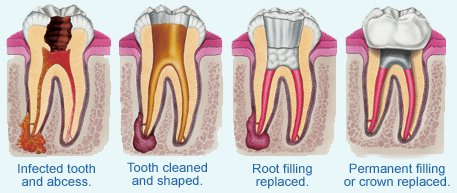Don’t Endure Tooth Pain Any Longer
Root canal therapy is an effective solution for saving a damaged or infected tooth. Despite its daunting reputation, many patients find that root canal treatment is a safe method to restore oral health and preserve their natural teeth.
In this detailed guide, our Hilliard, OH, dentist outlines the essentials of root canal treatment to help patients feel prepared for their procedures. Contact our Hilliard dental office today by calling (614) 771-6060 to book an appointment.

What Is Root Canal Therapy?
Root canal therapy, also referred to as endodontic therapy, is a dental procedure designed to eliminate the infected pulp, which is the soft tissue inside the tooth, and to clean and shape the root canals. Afterward, the root canals are filled and sealed to prevent bacteria from causing reinfection. This process helps preserve the tooth and prevents further damage or infection.
Each tooth has a soft inner layer called the pulp, which resides in the pulp chamber. The pulp contains nerves, blood vessels, and connective tissue that maintain the tooth’s health and vitality. When the pulp becomes infected or damaged, it can result in pain, sensitivity, and even tooth loss.
Anatomy of a Tooth
Each tooth consists of three main parts:
- Crown: The dental crown is the visible section of the tooth above the gum line. It is protected by enamel, the hardest substance found in the human body.
- Dentin: Beneath the enamel is the dentin, a yellowish layer that constitutes the majority of the tooth’s structure. While not as hard as enamel, dentin still provides essential support and protection.
- Pulp: The pulp is the innermost section of the tooth. It contains nerves, blood vessels, and connective tissues, playing a crucial role in the tooth’s development during childhood.
When Is Root Canal Therapy Necessary?
Root canal therapy becomes essential in various situations, such as:
- Dental Decay: If a cavity is left untreated, it can extend to the tooth’s pulp and lead to an infection.
- Dental Trauma: A fractured or chipped tooth can provide an entry point for bacteria to reach the pulp, causing infection.
- Gum Disease: Gum disease can create pockets around the tooth, allowing bacteria to infiltrate and infect the pulp.
Root canal therapy is often the most effective way to address these issues, preventing further damage to the tooth and surrounding tissues. Reach out to our highly-rated Hilliard dentist today for assistance.
Signs of Dental Infection
If you notice any of the following symptoms, it could indicate a dental infection that necessitates root canal therapy:
- Intense toothache
- Sensitivity to hot and cold
- Swelling and tenderness in the gums
- Tooth discoloration
- Discomfort when chewing or biting
Should you experience any of these symptoms, schedule an appointment with Dr. Nathan Desai by calling (614) 771-6060 promptly to receive an accurate diagnosis and appropriate treatment plan.
Benefits of Root Canal Treatment
Undergoing root canal treatment offers several benefits, including:
- Tooth Preservation: Root canal therapy can save an infected tooth that might otherwise require extraction.
- Pain Relief: This dental procedure can alleviate the pain and discomfort caused by an infection or damage to the pulp.
- Prevention of Further Damage: By removing the infected or damaged pulp, root canal treatment helps prevent additional harm to the tooth and surrounding tissues.
- Functional Restoration: Once filled, a tooth that has undergone root canal therapy can be fully restored to function like a natural tooth.
Endodontic Treatments
There are various types of endodontic treatments, and the one you receive will depend on your specific dental needs. Common endodontic treatments include:
- Root Canal Therapy: This involves removing the infected or damaged pulp, and then cleaning and filling the root canal. After the canal is filled, the tooth is restored with a filling or crown.
- Apicoectomy: Sometimes, root canal therapy alone may not be sufficient to treat the infection or damage. In such cases, an apicoectomy might be necessary. This procedure involves removing the tip of the root and any infected tissue, and then sealing the root to prevent further infection.
- Pulp Capping: If the tooth damage is minor and hasn’t led to an infection, your dentist might suggest a pulp capping procedure. This involves placing a special material over the damaged pulp to promote healing and prevent further damage.
- Regenerative Endodontics: This newer form of root canal therapy helps the damaged pulp in young teeth to heal and regenerate. It involves using special materials to stimulate the growth of new pulp tissue and blood vessels within the tooth.
- Root Canal Retreatment: Occasionally, a tooth that has undergone root canal therapy may become reinfected. In such instances, non-surgical root canal retreatment may be needed to eliminate the infection and restore the tooth.
The Root Canal Treatment Process
Here’s what you can expect with a root canal treatment:
- X-rays: Initially, our dentist will take X-rays to examine the shape of the root canals and check for any signs of infection in the surrounding bone.
- Dental Sedation: A local anesthetic is applied to numb the affected tooth, ensuring the procedure is comfortable for the patient. If you’re particularly anxious, discuss with your dentist about available dental sedation options.
- Pulpectomy: An opening is drilled into the tooth to access the pulp. Specialized tools are then used to remove the pulp, bacteria, decayed nerve tissue, and any related debris from inside the tooth and its root canal.
- Cleaning and Shaping: Once the pulp is removed, the dentist will clean, enlarge, and shape the canals in preparation for the filling. This is typically done using small files and a disinfecting solution to eliminate any remaining bacteria and clear away debris.
- Filling the Canals: After cleaning, the canals are sealed with a biocompatible material, usually a rubber-like substance called gutta-percha. The gutta-percha is placed with adhesive cement to ensure the canals are completely sealed.
- Temporary Filling: A temporary filling material is placed over the gutta-percha to close the opening until the tooth is ready for permanent restoration. This temporary filling is removed before the tooth is permanently restored.
- Restoration: Once healing is complete, the tooth requires a permanent restoration, such as a dental crown or filling, to replace the lost tooth structure and provide a complete seal. This step is vital to protect the tooth from future infection or breakage and to restore its function.
After the root canal procedure, your tooth might be sensitive for a few days, but this can usually be managed with over-the-counter pain relievers. Despite its reputation, most patients find the procedure no more painful than getting a dental filling.
Frequently Asked Questions
Is root canal therapy safe?
Absolutely! Root canal therapy is widely regarded as a safe procedure. It helps avoid the need for getting your tooth extracted by removing the infected or damaged pulp from the tooth’s root canal and filling it with a biocompatible material.
Can root canal therapy be performed on any tooth?
Root canal therapy can be performed on most teeth, although there are some exceptions. Teeth that have extensive decay, significant damage, or fractures might not be suitable candidates for this treatment. In such instances, tooth extraction may be necessary instead.
How long does a root canal treatment take?
Typically, a root canal procedure can be completed in one or two appointments. The length of the treatment depends on the complexity of the tooth and the severity of the damage. Following the root canal treatment, the tooth may require restoration with a crown or filling to ensure protection and restore its full functionality.
Don’t Delay the Treatment You Require
While root canal therapy might appear daunting, having the right knowledge and a skilled dentist can make it a safe and effective solution for a variety of dental issues. By learning what the procedure involves, how it is performed, and when it is necessary, you can make well-informed choices about your dental health and receive the treatment needed to maintain a healthy, radiant smile.
If you suspect you might need a root canal, reach out to our Hilliard dental office at (614) 771-6060 to book a consultation today. We are proud to serve patients from Columbus, Dublin, Upper Arlington, Grove City, Westerville, and the surrounding areas.







